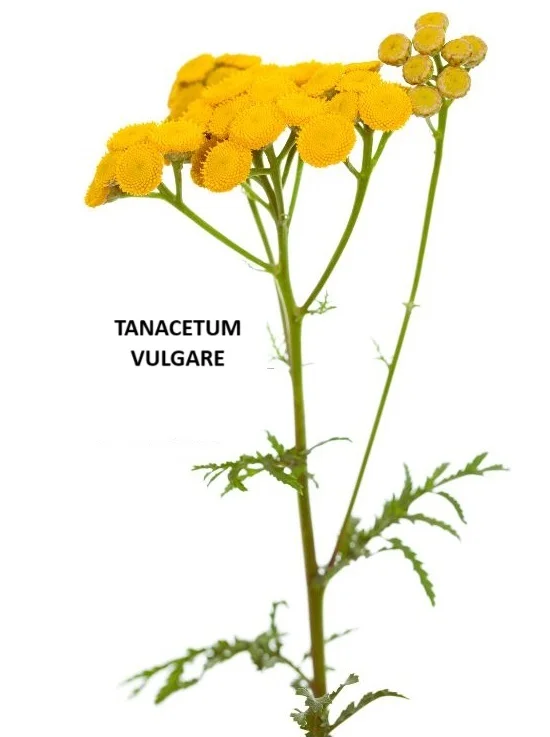Tanacetum vulgare, commonly known as Tansy, is a plant with a long history of medicinal use, particularly in treating nervous disorders and digestive issues.
In homeopathy, it is valued for its effects on conditions like chorea, reflex spasms caused by worms, and for its potential to counteract poison ivy.
It is especially beneficial for fatigue, nervous exhaustion, and menstrual complaints.

Table of Contents
ToggleSOURCE INFORMATION
Scientific Classification
- Family: Asteraceae
- Genus: Tanacetum
- Species: T. vulgare
- Common Name: Tansy
Origin and Historical Facts
- Native to Europe and Asia, Tansy has been used in traditional medicine for centuries, often for digestive complaints, parasitic infections, and as a tonic.
- In folk medicine, it was also employed as an insect repellent and for menstrual regulation.
- Tansy was known in medieval times as a remedy for worms, and its use extended to ailments such as rheumatism and fever.
DRUG PATHOGENESIS
- Tanacetum vulgare acts mainly on the nervous and digestive systems.
- It induces a state of profound fatigue, nervousness, and digestive irregularities.
- Its pathogenesis reflects the exhaustion and spasmodic tendencies seen in patients suffering from reflex spasms, chorea, or bowel issues.
KEY CHARACTERISTICS
- Nervous Exhaustion: Profound lassitude and a feeling of being “half dead, half alive.”
- Headaches: Heavy and dull headaches, aggravated by exertion.
- Mental Fatigue: Irritability, sensitivity to noise, and mental confusion.
- Abdominal Issues: Pain in the bowels, relieved after stool, along with a desire for a bowel movement immediately after eating.
- Respiratory Issues: Laboured breathing with frothy mucus obstructing the airways.
DETAILED ORGAN SYMPTOMS
- Head: Confusion and dullness, with a feeling of heaviness in the head. Headaches easily triggered by minor physical or mental exertion.
- Mental Symptoms: Irritability, sensitivity to noise, and general mental fatigue. Symptoms are often worse in closed or stuffy environments.
- Ears: Roaring or ringing in the ears, with strange sensations, such as the feeling that the ears are closing suddenly.
- Abdomen: Pain in the bowels, often relieved by-passing stool. There is a tendency for dysentery and an urgent need for a bowel movement immediately after eating.
- Female Reproductive System: Dysmenorrhea with pronounced bearing-down pains and tenderness in the groins. Menstrual periods may be suppressed at first but later become profuse.
- Respiratory System: Laboured and stertorous breathing, with frothy mucus obstructing the air passages, which may lead to difficulty in respiration.
MODALITIES
- Worse: In closed rooms, from exertion, and with noise.
- Better: After stool and in open air.
WHAT ARE MODALITIES IN HOMOEOPATHY?
RELATIONSHIP WITH OTHER DRUGS
- Compare: Cimicifuga (for nervous system symptoms), Cina (for worm infestations), Absinthium (for digestive and nervous system issues).
- Follows Well After: Nux vomica, particularly in cases of indigestion or irritability.
DOSE
- Recommended Potency: Tincture to third potency, depending on the severity of symptoms.
Frequently Asked Questions
What conditions can Tanacetum vulgare treat?
- It is particularly useful for nervous exhaustion, digestive disturbances, dysmenorrhea, and respiratory issues.
How is it administered in homeopathy?
- It can be used in tincture form or in potencies up to the third dilution. Consult a homeopath for specific dosage recommendations.
Can Tanacetum vulgare help with menstrual problems?
- Yes, it is commonly used for dysmenorrhea (painful menstruation) and cases where periods are suppressed and later become profuse.
Meaning of Difficult Words
- Lassitude: A state of physical or mental weariness; lack of energy.
- Chorea: A disorder that causes involuntary, unpredictable body movements.
- Stertorous: Characterized by heavy snoring or labored breathing.
- Dysmenorrhea: Painful menstruation.
- Frothy Mucus: Bubbly or foamy mucus, often produced in excessive amounts.
